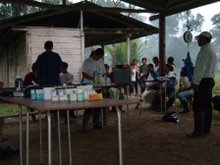Why do aid agencies assume they have to do it all? As we know from our readings on global health initiatives, local people and frontline providers of goods and services must be empowered to distribute any kind of development aid that gets dished out. It's the only way for that development to have any kind of lasting effect.
While researching for my paper I realized just how great a tool information technology would be for developing countries. Information is power. That Chinese baby I mentioned in my last blog? If her parents had the internet, they could have diagnosed her malnutrition themselves, before it was too late. And they would have, except for the fact that people like them, who have access to limited information and sub-par goods and services, don't even know that the internet exists. Many of these poorest of the poor don't even know that they are referred to, by some, as human rights violations.
The internet would be a wonderful tool for people in rural, developing areas to have. It would allow them to communicate suspected infectious disease outbreaks, request needed supplies to uphold quality of care, and put the power of information in the hands of those who have the greatest incentive to use it wisely and well. Access to information in areas where governing bodies are highly corrupted would also force centralized powers to be more transparent, more accountable, and more in-tune with the wants and needs of the people they're supposed to be serving.
Tuesday, January 30, 2007
Subscribe to:
Post Comments (Atom)





2 comments:
I couldn’t agree more… dissemination of information would be so much quicker, easier, and attainable if more people had access to today’s technologies. I was thinking about class (PM 565) and how our use of blogs, the discussion board, and im conversations make our learning experience so much more efficient. It would be so much harder (I won’t say impossible because it had to been done somehow before this great innovation) to reap all the benefits other people’s knowledge has to offer and absorb all the information that is out there without access to the internet.
It is also important to consider the negative implications something like the internet might bring to a society. It may be hard to imagine, but just as globalization brings both positive and negative influences to countries, we should be prepared to tackle all aspects increased technology can carry.
Have you ever heard of a guy by the name of Nicholas Negroponte? He's a computer scientist from MIT and created a non-profit organization called One Laptop Per Child (OLPC). He and others want to bring computers and the internet to children in developing countries. The organization is in the process of developing inexpensive laptops, only $100! It's such a great idea. Here's a link to read more about it:
http://en.wikipedia.org/wiki/One_Laptop_Per_Child
Post a Comment